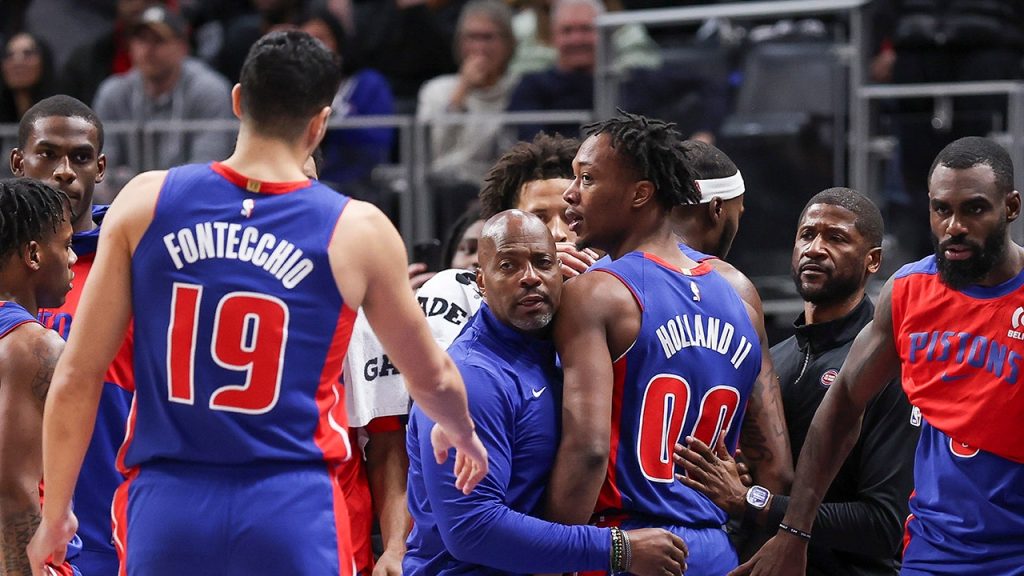The Thursday night NBA matchup between the Detroit Pistons and the Utah Jazz witnessed a dramatic turn of events when a third-quarter altercation led to the ejection of two players, Jordan Clarkson of the Jazz and Ron Holland II of the Pistons. The incident began after a Pistons basket, when Paul Reed of the 76ers bumped into Clarkson. Clarkson’s verbal response to the bump prompted Reed to nudge him aside in an attempt to return to his defensive position. However, Holland, seemingly taking umbrage at Reed’s treatment, stepped in to confront Clarkson. The situation escalated quickly as Clarkson shoved Holland, and the two players squared off, poised for a physical confrontation. Though teammates and officials intervened before any punches were thrown, the referees deemed the players’ actions worthy of ejection, removing both Clarkson and Holland from the game.
This on-court altercation overshadowed a comeback attempt by the Pistons, who had trailed by as much as 29 points. Despite managing to narrow the deficit to a mere five points late in the fourth quarter, the Jazz ultimately pulled away, securing a 126-119 victory. Collin Sexton led the scoring for the Jazz with 30 points, while Lauri Markkanen contributed a double-double performance with 27 points and 14 rebounds. This win marks only the sixth victory for the Jazz in 26 games this season, highlighting their struggles. The Pistons, with their loss, now hold an 11-17 record.
Interestingly, this incident occurs against the backdrop of declining NBA viewership. Ratings have reportedly dropped by approximately 25% compared to the previous year, prompting discussions about the possible causes and potential remedies. LeBron James, one of the league’s most prominent figures, has offered his perspective on the declining ratings, suggesting that the NBA needs to take action to address the issue. While he hasn’t explicitly linked the decline to on-court altercations, incidents like the one between Clarkson and Holland might contribute to a perception of increased negativity or lack of sportsmanship, which could potentially influence viewer engagement.
The ejection of Clarkson and Holland underscores the importance of maintaining composure and sportsmanship during games. While emotions inevitably run high in competitive environments, players have a responsibility to control their reactions and avoid escalating situations. The NBA has clear rules in place to address such incidents, and the referees’ decision to eject both players demonstrates the league’s commitment to enforcing those rules and maintaining a certain standard of conduct on the court. These ejections serve as a reminder to players of the consequences of their actions and the importance of upholding the integrity of the game.
This incident also raises questions about the role of teammates in such situations. While Holland’s intention might have been to defend his teammate, Reed, his intervention ultimately escalated the conflict and resulted in his own ejection. This highlights the delicate balance between supporting teammates and avoiding unnecessary confrontations. Ideally, teammates should aim to de-escalate tensions and prevent situations from spiraling out of control. In this particular instance, a more measured response from Holland could have potentially prevented the ejections and allowed the game to continue without further interruption.
Beyond the immediate consequences for the players and teams involved, this altercation feeds into the larger conversation surrounding player behavior and its impact on the perception of the NBA. While such incidents attract attention and can generate controversy, they can also detract from the overall enjoyment of the game for fans. As the NBA grapples with declining ratings, it faces the challenge of balancing the intensity and passion of the sport with the need to maintain a positive and respectful environment both on and off the court. Incidents like the one between Clarkson and Holland serve as a reminder of the ongoing need for players, coaches, and league officials to work together to promote sportsmanship and ensure that the focus remains on the game itself.

